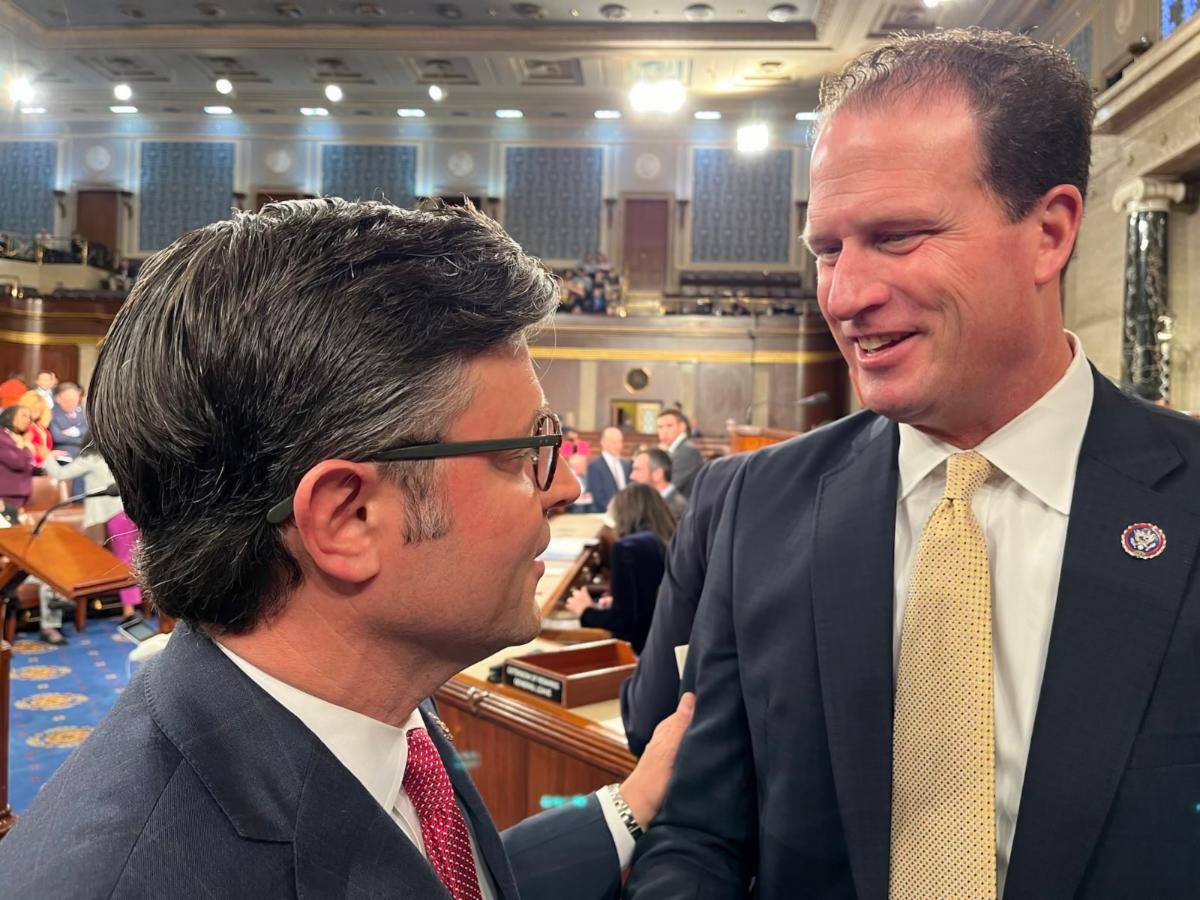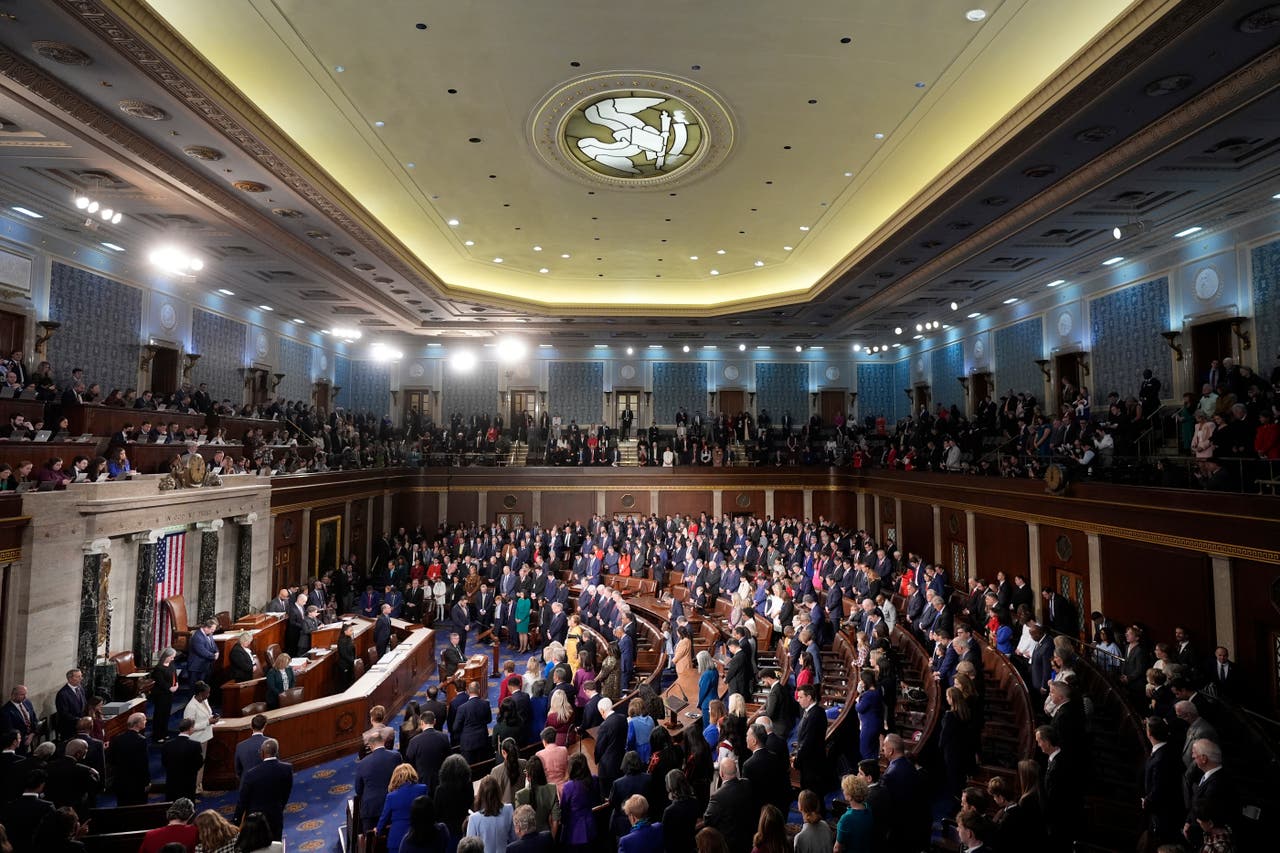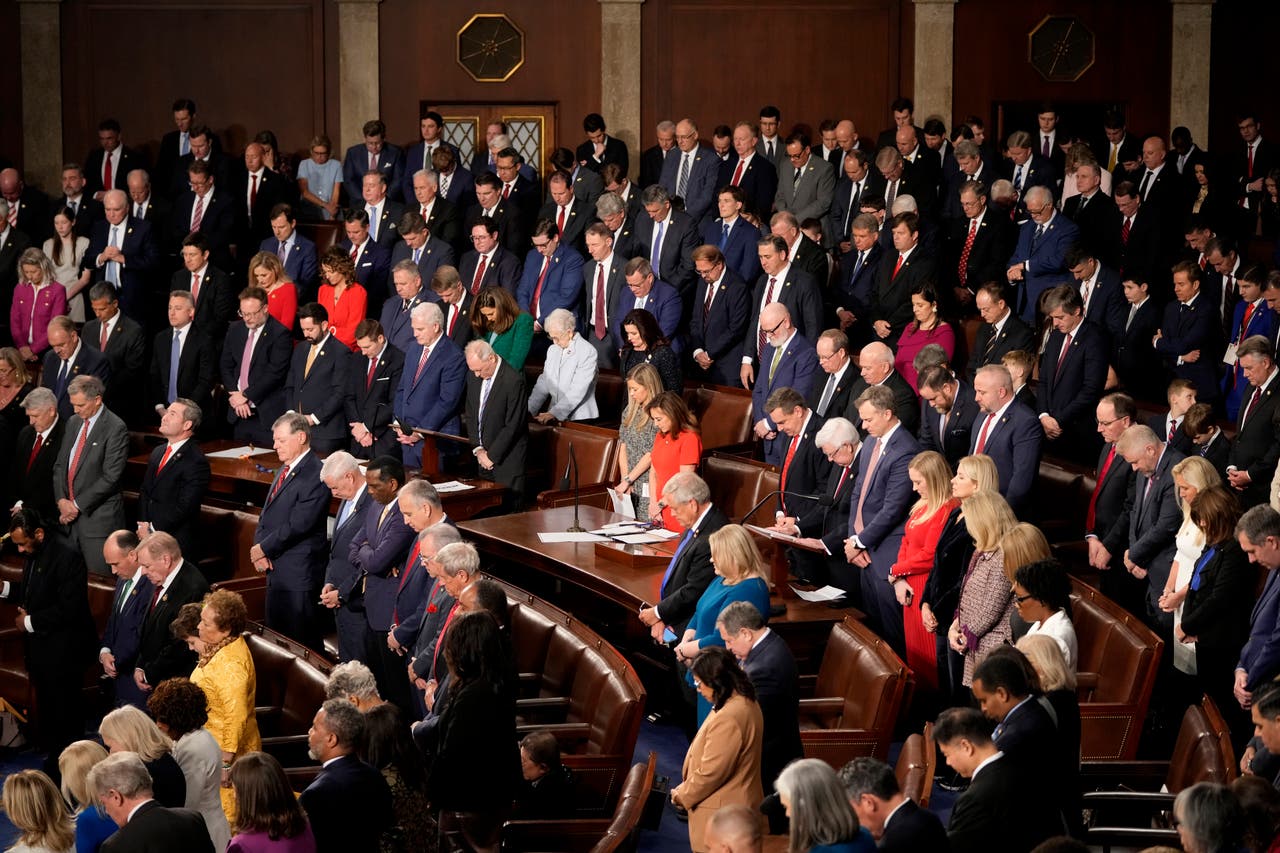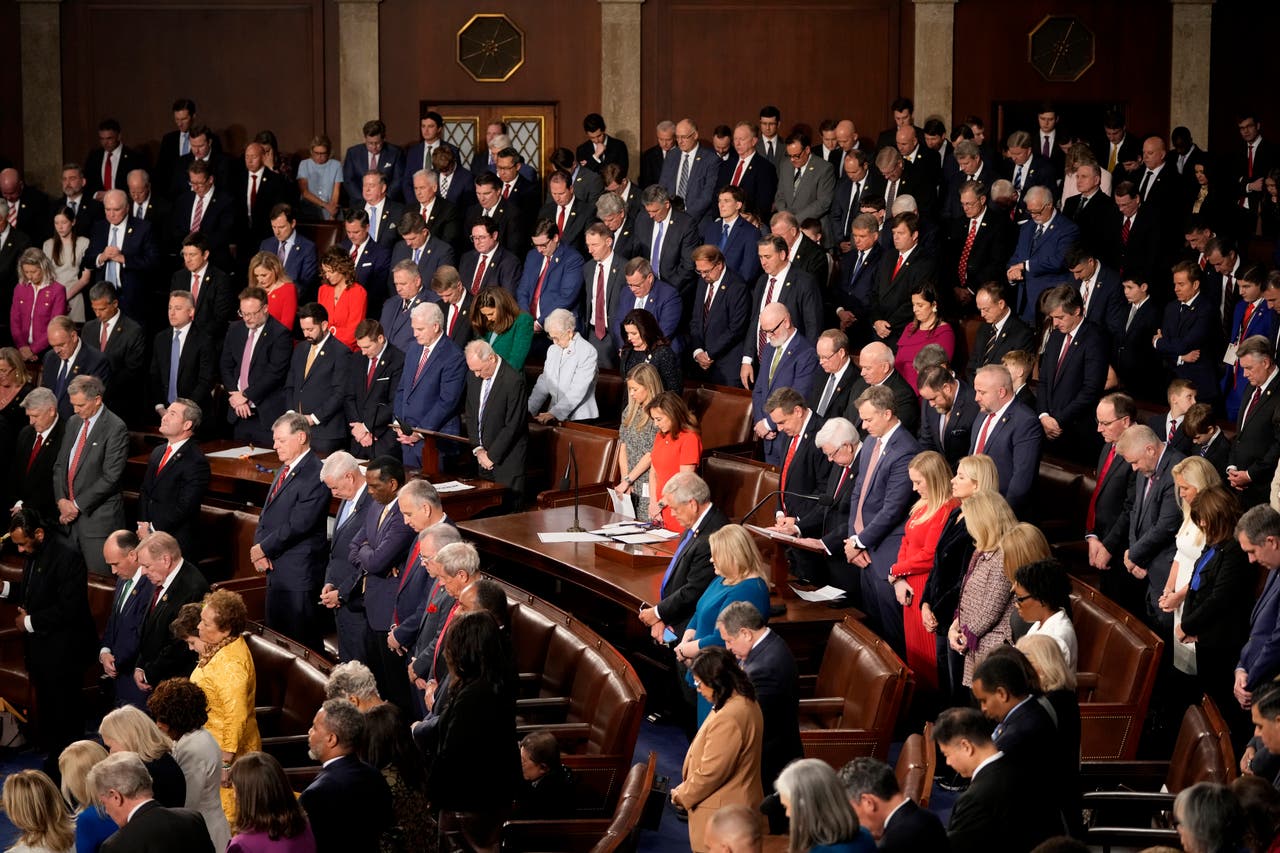Republican Mike Johnson reelected House speaker after dramatic events unfolded during a tense election process. The voting stretched over multiple rounds, revealing deep divisions within the Republican party and highlighting the challenges facing the new Speaker. This article delves into the political maneuvering, the key players, and the potential impact of Johnson’s election on the House of Representatives and the nation.
We’ll explore Johnson’s political background, examining his platform and comparing it to other candidates. We’ll also analyze the immediate reactions from the media and the public, dissecting the varying opinions and assessing the overall sentiment. Finally, we’ll look ahead, considering the potential challenges and opportunities that lie ahead for Johnson and the House under his leadership.
The Republican House Speakership: Mike Johnson’s Election: Republican Mike Johnson Reelected House Speaker After Dramatic
The election of Mike Johnson as House Speaker marked a dramatic turn in American politics. The process was fraught with tension, revealing deep divisions within the Republican party and raising questions about the future direction of the House of Representatives. This article details the election process, Johnson’s background, the impact on the House, public reaction, and potential future implications.
The House Speaker Election Process

The House Speaker election unfolds through a series of voting rounds. Representatives cast ballots for their preferred candidate. A candidate needs a majority (more than half) of the votes cast to win. If no candidate secures a majority in the first round, subsequent rounds are held until a winner emerges. Each round amplifies the pressure, with failed candidates often withdrawing or shifting their support, leading to dramatic shifts in alliances and outcomes.
The numerous rounds in Johnson’s election highlighted the significant internal disagreements within the Republican caucus.
Key moments of tension included several failed ballots, intense negotiations behind closed doors, and public displays of frustration and disagreement among Republican representatives. The drawn-out process underscored the deep divisions within the party and the difficulty in forging a consensus around a single candidate.
| Name | Party Affiliation | Role | Key Actions |
|---|---|---|---|
| Mike Johnson | Republican | Candidate, eventual Speaker | Secured enough support to win after multiple rounds of voting. Negotiated with various factions within the Republican party. |
| [Candidate 2 Name] | Republican | Candidate | [Describe Candidate 2’s actions, e.g., initial strong showing, eventual withdrawal, endorsements given] |
| [Candidate 3 Name] | Republican | Candidate | [Describe Candidate 3’s actions, e.g., gained and lost support throughout the voting process, key endorsements] |
| [Candidate 4 Name] | Republican | Candidate | [Describe Candidate 4’s actions, e.g., remained a contender for several rounds, impact on the overall dynamics] |
Mike Johnson’s Political Background and Platform

Before his election as Speaker, Mike Johnson served as a U.S. Representative for Louisiana’s 4th congressional district. He is known for his conservative political positions, aligning closely with the Republican party’s platform. His positions on key issues such as abortion, gun control, and taxation are generally considered to be on the more conservative end of the Republican spectrum.
Compared to other Republican candidates, Johnson presented a platform that emphasized fiscal responsibility, limited government, and a strong national defense. While specifics varied, the main point of differentiation often lay in the candidates’ approaches to navigating the internal divisions within the Republican party and their strategies for governing effectively in a potentially divided Congress.
A timeline of his significant political milestones would include his election to the House of Representatives, key committee assignments, significant legislative achievements, and his increasing prominence within the Republican party leading up to his Speakership bid.
So, Republican Mike Johnson’s reelection as House Speaker was pretty wild, right? All that drama makes you think about making solid career choices, like carefully considering choosing the right IT courses based on career goals to build a stable future. After all, a strong career path is less dramatic than a political showdown! Hopefully, Mike Johnson’s win means smoother sailing for some legislative agendas.
Impact on the House of Representatives
Mike Johnson’s election as Speaker has significant implications for the functioning and legislative priorities of the House. His leadership style and political alliances will shape the legislative agenda, committee assignments, and the overall tone of House proceedings. The potential for increased partisan gridlock or unexpected bipartisan cooperation remains a key consideration.
- Short-Term Effects: Increased focus on certain legislative priorities (e.g., tax cuts, border security); potential delays in passing legislation due to internal party disagreements; increased media scrutiny of House actions.
- Long-Term Effects: Potential shifts in legislative priorities; impact on the 2024 election cycle; lasting changes in the balance of power within the House; altered relationship with the Senate and the executive branch.
Public and Media Reaction to the Election

News outlets and political commentators offered a wide range of reactions to Johnson’s election, reflecting the diverse political landscape. Conservative media outlets generally celebrated the outcome, while liberal media outlets expressed concerns about the potential impact on legislative progress and the broader political climate. Public opinion was similarly divided, with strong opinions expressed on both sides of the political spectrum.
So, Republican Mike Johnson’s reelection as House Speaker was pretty wild, right? A total rollercoaster! It’s a far cry from the world of sports, but speaking of high stakes, check out the Nipissing Lakers women’s hockey team has high hopes for the upcoming season; they’re aiming for the big win. Back to politics, Johnson’s victory definitely shows the intense power struggles within the Republican party.
Overall, the election generated considerable public interest and intense political debate. The drawn-out voting process and the internal divisions within the Republican party were widely discussed and analyzed, highlighting the challenges facing the party and the broader political system.
Political Implications and Future Prospects
Johnson’s election has significant implications for the internal dynamics of the Republican party. It reflects the balance of power within the party and the success of various factions in shaping the leadership. Future challenges for Johnson include maintaining unity within the Republican caucus, navigating potential disagreements with the Senate and the President, and successfully advancing the party’s legislative agenda.
| Potential Challenges | Potential Solutions |
|---|---|
| Maintaining party unity amidst internal divisions. | Strategic compromise and negotiation; prioritizing common goals; fostering open communication. |
| Passing legislation in a potentially divided Congress. | Seeking bipartisan support; focusing on areas of common ground; employing effective negotiation strategies. |
| Managing public perception and media scrutiny. | Transparent communication; proactive engagement with the media; consistent messaging. |
Visual Representation of Key Events, Republican Mike Johnson reelected House speaker after dramatic

A visual representation of the most dramatic moment during the voting process might depict the House floor during a crucial ballot count. The image would showcase the tense atmosphere, with representatives engaged in hushed conversations or displaying visible anxiety. Close-ups of key players’ faces would reveal expressions of anticipation, frustration, or relief, reflecting the high-stakes nature of the situation.
The setting would be the House chamber, emphasizing the formal and historic context of the event.
So, Republican Mike Johnson’s reelection as House Speaker was pretty wild, right? All that drama aside, if you’re thinking about a career change, you might want to check out the full stack developer salary expectations and job outlook – it’s a pretty stable field. Then again, maybe politics is more your speed after seeing all the excitement surrounding Johnson’s win!
An illustration depicting the key players in the pre-election negotiations could showcase a series of smaller meetings, perhaps in a backroom setting, with individuals engaged in intense discussions. The visual would emphasize the strategic alliances and behind-the-scenes maneuvering that ultimately led to Johnson’s victory. Body language, facial expressions, and the physical arrangement of the individuals would convey the complexity and intensity of the negotiations.
The shift in voting patterns across multiple rounds could be visualized through a bar graph. Each bar would represent a voting round, with the height corresponding to the number of votes received by each candidate. The graph would clearly demonstrate the gradual increase in support for Johnson and the corresponding decline in support for other candidates, illustrating the dynamic nature of the election process.
Last Word
The reelection of Mike Johnson as House Speaker, following a dramatic and protracted voting process, marks a significant moment in American politics. His victory, while solidifying Republican control, also underscores the internal divisions within the party. The coming months will be crucial in observing how Johnson navigates these challenges and sets the legislative agenda for the House. His success will depend on his ability to unify his party and effectively lead the chamber through a potentially turbulent legislative session.
FAQ Compilation
What are some of Mike Johnson’s key policy positions?
Johnson generally holds conservative views, aligning with the Republican party’s platform on issues such as fiscal policy, social issues, and national security. Specific policy positions would require further research into his voting record and public statements.
How long did the Speaker election take?
The exact duration varied depending on the counting and procedural delays but spanned multiple rounds of voting, taking considerably longer than a typical election.
What were the main points of contention during the voting process?
The main points of contention likely revolved around differing factions within the Republican party and their differing visions for the direction of the House and the country. Specific details would need to be sourced from news reports covering the election.
